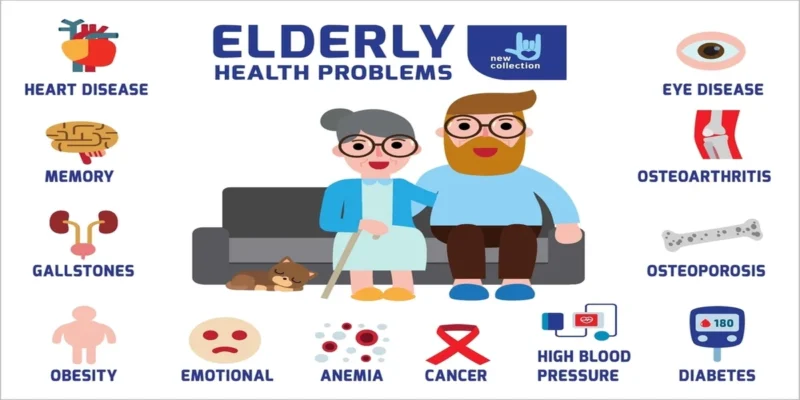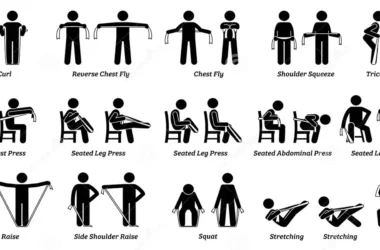[ez-toc]
Introduction
As individuals age, they often face various health challenges that can significantly impact their quality of life. Common health issues in elderly individuals include cardiovascular diseases, arthritis, osteoporosis, diabetes, and cognitive decline.
However, there is good news. Engaging in regular exercise can play a vital role in promoting and maintaining the overall health and well-being of elderly individuals.
This article explores the common health issues faced by elderly individuals and highlights how exercise can help address these challenges.
Understanding the Aging Process
Aging is a natural process that affects every individual. With age, the body undergoes several physiological changes, including a decrease in muscle mass, bone density, and cardiovascular function. These changes can contribute to the development of various health issues.
Common Health Issues in Elderly Individuals
- Cardiovascular Diseases: The risk of cardiovascular diseases, such as heart disease and stroke, increases with age. Sedentary lifestyles and poor cardiovascular health can exacerbate these risks.
- Arthritis and Joint Pain: Arthritis, a condition characterized by inflammation and stiffness in the joints, is common among the elderly. Joint pain and reduced mobility can significantly impact daily activities.
- Osteoporosis: Aging is associated with a decline in bone density, leading to a higher risk of fractures and osteoporosis. Weak and brittle bones can result in severe consequences for the elderly.
- Diabetes: Type 2 diabetes is more prevalent in older individuals due to factors like decreased physical activity, weight gain, and insulin resistance. Managing blood sugar levels becomes crucial for maintaining overall health.
- Cognitive Decline: Many elderly individuals experience cognitive decline, including memory loss and reduced cognitive function. Conditions like Alzheimer’s disease and dementia can have a significant impact on their daily lives.
Also Read: The Importance of Flexibility Exercises for Aging Bodies
Benefits of Exercise for the Elderly
Regular exercise can offer numerous benefits to elderly individuals, helping them combat the common health issues mentioned earlier.
Some of the key benefits include:
- Improving Cardiovascular Health: Engaging in aerobic exercises like walking, swimming, or cycling can improve heart health, lower blood pressure, and reduce the risk of cardiovascular diseases.
- Strengthening Muscles and Joints: Strength training exercises, such as weightlifting or resistance training, help build and maintain muscle mass and strength. This can alleviate joint pain and enhance overall mobility.
- Enhancing Bone Density: Weight-bearing exercises like walking, dancing, or stair climbing can promote bone health and increase bone density, reducing the risk of fractures and osteoporosis.
- Managing Blood Sugar Levels: Regular physical activity improves insulin sensitivity, allowing better management of blood sugar levels in individuals with diabetes or at risk of developing diabetes.
- Boosting Cognitive Function: Exercise has been shown to have a positive impact on cognitive function and can help slow down cognitive decline. It promotes the growth of new brain cells and enhances memory and mental clarity.
Choosing the Right Exercise Regimen
To reap the maximum benefits of exercise, elderly individuals should choose an exercise regimen that suits their needs and abilities.
Here are some recommended exercises:
- Low-Impact Aerobic Exercises: Activities like brisk walking, swimming, or cycling provide cardiovascular benefits without putting excessive stress on the joints.
- Strength Training: Incorporating strength training exercises using resistance bands or light weights helps maintain muscle mass and strength.
- Balance and Flexibility Exercises: Yoga, tai chi, or simple balance exercises can improve stability, reduce the risk of falls, and enhance overall flexibility.
Overcoming Barriers to Exercise
While exercise is beneficial, certain barriers can discourage elderly individuals from engaging in physical activity.
Here are some strategies to overcome these barriers:
- Tailoring Exercise to Individual Needs: Considering health conditions, physical limitations, and personal preferences, it’s important to customize exercise programs to ensure safety and enjoyment.
- Creating a Supportive Environment: Family members and caregivers can provide encouragement, support, and companionship during exercise sessions, making the experience more enjoyable and motivating.
- Seeking Professional Guidance: Consulting with healthcare professionals, such as doctors or physiotherapists, can help create personalized exercise plans and address any concerns or questions.
Conclusion
Exercise is a powerful tool for promoting the health and well-being of elderly individuals.
By incorporating regular physical activity into their lives, they can improve cardiovascular health, strengthen muscles and joints, enhance bone density, manage blood sugar levels, and boost cognitive function.
With appropriate guidance and a tailored exercise program, the elderly can experience a better quality of life and maintain their independence for longer.






